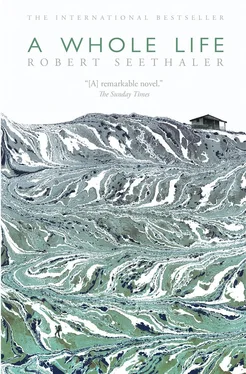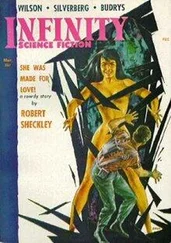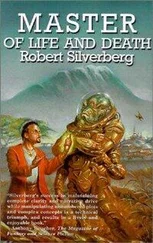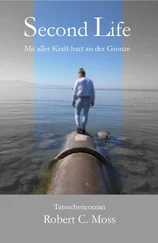Robert Seethaler - A Whole Life
Здесь есть возможность читать онлайн «Robert Seethaler - A Whole Life» весь текст электронной книги совершенно бесплатно (целиком полную версию без сокращений). В некоторых случаях можно слушать аудио, скачать через торрент в формате fb2 и присутствует краткое содержание. Год выпуска: 2015, Издательство: House of Anansi Press Inc, Жанр: Современная проза, на английском языке. Описание произведения, (предисловие) а так же отзывы посетителей доступны на портале библиотеки ЛибКат.
- Название:A Whole Life
- Автор:
- Издательство:House of Anansi Press Inc
- Жанр:
- Год:2015
- ISBN:нет данных
- Рейтинг книги:4 / 5. Голосов: 1
-
Избранное:Добавить в избранное
- Отзывы:
-
Ваша оценка:
- 80
- 1
- 2
- 3
- 4
- 5
A Whole Life: краткое содержание, описание и аннотация
Предлагаем к чтению аннотацию, описание, краткое содержание или предисловие (зависит от того, что написал сам автор книги «A Whole Life»). Если вы не нашли необходимую информацию о книге — напишите в комментариях, мы постараемся отыскать её.
Set in the mid-twentieth century and told with beauty and tenderness, his story is one of man's relationship with an ancient landscape, of the value of solitude, the arrival of the modern world, and above all, of the moments, great and small, that make us who we are.
A Whole Life — читать онлайн бесплатно полную книгу (весь текст) целиком
Ниже представлен текст книги, разбитый по страницам. Система сохранения места последней прочитанной страницы, позволяет с удобством читать онлайн бесплатно книгу «A Whole Life», без необходимости каждый раз заново искать на чём Вы остановились. Поставьте закладку, и сможете в любой момент перейти на страницу, на которой закончили чтение.
Интервал:
Закладка:
That same year a new teacher came to the village, a young man with a boyish face and shoulder-length hair tied back in a little ponytail, who spent his evenings knitting jerseys and carving roots into small, twisted crucifixes. The quiet and discipline of the old days never returned to the school, and Egger got used to the racket behind his bedroom wall. He only saw the teacher Anna Holler once more. She was walking across the village square with a shopping basket. She was walking slowly, with unnaturally small steps; her head was lowered, and she seemed to be completely lost in thought. When she saw Egger she raised her hand and waved to him with her fingers as you would to a little child. Egger quickly looked at the ground. Afterwards he was ashamed of this moment of cowardice.
Anna Holler left the village as quietly and inconspicuously as she had arrived. One cold morning, before sunrise, she climbed aboard the post bus with two suitcases, sat down in the back seat, closed her eyes, and, as the driver later reported, didn’t open them again once throughout the journey.
That autumn the snow came early. Just a few weeks after Anna Holler’s departure the skiers were already forming long queues outside the valley stations, and the metallic click of ski bindings and the creak of ski boots could be heard all over the village until late into the evenings. One cold, clear, sunny day shortly before Christmas, as Egger was on his way home after taking a few elderly hikers for a walk in the snow, a group of excited tourists, followed by a few locals, the village policeman and a horde of screeching children, came walking towards him on the other side of the street. Two young men in ski suits had converted their skis into a kind of stretcher, and on it lay something that could evidently only be transported with the utmost care. The men were handling this something with a curious reverence that reminded Egger of the zeal of servers creeping round the altar during Sunday Mass. He crossed the street to take a closer look at the spectacle, and what he saw stopped his breath. On the makeshift stretcher lay Horned Hannes.
For a moment Egger thought he must have gone mad, but there was no doubt about it: before him lay the goatherd, or what was left of him. His body was frozen solid. From what Egger could see he appeared to be missing one leg, while the other stuck out over the side of the stretcher, grotesquely dislocated. His arms were wrapped tightly around his chest; dried scraps of flesh hung from his hands, and the bones of his fingers, almost entirely exposed, were crooked like the talons of a bird. His head was tilted right back on his neck, as if someone had yanked it violently backwards. The ice had torn half his face off the bone. His teeth in the blue-black gums were exposed and it looked as if he was grinning. Although both eyelids were missing, the eyes were completely intact and seemed to be staring, wide open, at the sky.
Egger turned away, took a few steps, stopped again. He felt sick and there was a dark buzzing in his ears. He wanted to say something to the men — but what? The thoughts danced in his head. He couldn’t formulate any of them, and by the time he turned again they had long since moved on. They were right at the bottom of the street, proceeding towards the chapel with their icy burden. On one side walked the policeman. On the other the goatherd’s leg jutted up into the air like a withered root.
A couple of adventurous cross-country skiers had found Horned Hannes off-piste in a crevasse high in the Ferneis glacier. It took them hours to hack him out of the perpetual ice. The narrowness of the crevasse had, for the most part, kept birds and other animals away, and the ice had preserved his body through the decades. Only the leg was missing. The men speculated: perhaps an animal had got it before he slipped into the crevasse — perhaps a rock had cut it off — perhaps he had severed it himself in an act of desperation, to try and free himself. The mystery could not be solved: the leg had disappeared, and the stump revealed nothing. It was just a stump, coated in a delicate layer of ice, slightly frayed around the edges and blue-black in the centre like the goatherd’s gums.
The dead man was brought to the chapel so that everyone who wanted to could say goodbye. But no one came, apart from a few tourists who wanted to see with their own eyes the mysterious ice-corpse laid out by candlelight, and if possible to photograph it from every angle. No one knew Horned Hannes, no one could remember him, and as the weather forecast predicted a rise in temperature he was buried the following day.
Egger was profoundly shocked by this unexpected encounter. Almost a whole life lay between Horned Hannes’ disappearance and his turning up again. In his mind’s eye he saw the translucent figure moving away in great leaps and disappearing into the white silence of the blizzard. How had he made it to the glacier several kilometres away? What had he been looking for there? And what had happened to him in the end? Egger shuddered at the thought of the leg that was probably still stuck somewhere in the glacier. Perhaps in a few years it too would be found and carried down to the valley as an outlandish trophy on the shoulders of excited skiers. Horned Hannes presumably didn’t care about any of this. Now he lay in earth instead of ice: either way, he was at peace. Egger thought of the innumerable dead during his time in Russia. The grimaces of the corpses in the Russian ice were the most dreadful thing he had seen in his life. Horned Hannes, by contrast, seemed strangely happy. In his final hour he had laughed up at Heaven, thought Egger, and hurled his leg down the Devil’s throat as a forfeit. This idea pleased him: there was something comforting about it.
But there was another thought that preoccupied him. The frozen goatherd had looked at him as if through a window in time. There was something almost youthful in the expression on his face, turned up towards Heaven. Back then, when Egger found him in his hut, mortally ill, and carried him down to the valley on the wooden frame, he must have been about forty or fifty years old. Egger was now well over seventy, and he certainly didn’t feel any younger. Life and the work on the mountain had left their mark. Everything about him was warped and crooked. His back seemed to be heading down towards the earth in a tight curve, and he increasingly had the feeling that his spine was growing up over his head. On the mountain his foothold was still firm, and not even the strong autumn downwinds could make him lose his balance, but he stood like a tree that was already rotten inside.
* * *
In his final years Egger did not take up any more offers of work, which in any case became increasingly infrequent. He felt that in his life he had toiled enough; besides, he found the tourists’ chatter and their moods, which changed as constantly as mountain weather, increasingly hard to tolerate. On one occasion he almost boxed the ears of a young townie, who stood on a rock and, overcome with joy, closed his eyes and turned round and round in circles until he plummeted onto the gravel field below and had to be carried back down to the valley by Egger and the rest of the group, sobbing like a little child. After that, Egger ended his career as a mountain guide and retired from public life.
The population of the village had tripled since the war, and the number of guest beds had increased tenfold, which prompted the municipality to proceed not only with the construction of a holiday resort with an indoor swimming pool and spa garden, but also with the long-overdue extension of the school building. Egger moved out before the construction workers even arrived. He packed his few possessions and moved into a cattle shed several hundred metres above the end of the village, abandoned decades earlier. The shed was worked into the hillside like a cave, with the advantage that the temperature wasn’t subject to much fluctuation throughout the year. The front was constructed out of piled-up, weathered boulders. Egger filled the holes between them, first with moss, then with cement. He sealed the cracks in the door, painted the wood with pine tar, and scratched the rust off the hinges. Then he broke two stones out of the wall and replaced them with a window and a pipe for the sooty black stove he had found on a scrap heap behind the valley station of the Bubenkogel chair lift. He felt at ease in his new home. Sometimes it was a little lonely up there, but he didn’t regard his loneliness as a deficiency. He had no one, but he had all he needed, and that was enough. The view from the window was good, the stove was warm, and once the shed had been heated throughout the first winter, if not before, the pungent smell of goats and cattle would have completely disappeared. Above all, Egger enjoyed the quiet. Only a faint suggestion reached him of the noise that now filled the whole valley and, at weekends, surged against the mountainsides in waves. Sometimes, on summer nights, when the clouds hung heavy over the peaks and the air smelled of rain, he would lie on his mattress and listen to the sounds of animals burrowing through the earth above his head; and on winter evenings he heard the muffled drone of the distant snow groomers preparing the pistes for the following day. He often found himself thinking about Marie. About what had been, and about what could have been. But they were just brief, fleeting thoughts that drifted by as quickly as the shreds of storm clouds outside his window.
Читать дальшеИнтервал:
Закладка:
Похожие книги на «A Whole Life»
Представляем Вашему вниманию похожие книги на «A Whole Life» списком для выбора. Мы отобрали схожую по названию и смыслу литературу в надежде предоставить читателям больше вариантов отыскать новые, интересные, ещё непрочитанные произведения.
Обсуждение, отзывы о книге «A Whole Life» и просто собственные мнения читателей. Оставьте ваши комментарии, напишите, что Вы думаете о произведении, его смысле или главных героях. Укажите что конкретно понравилось, а что нет, и почему Вы так считаете.











